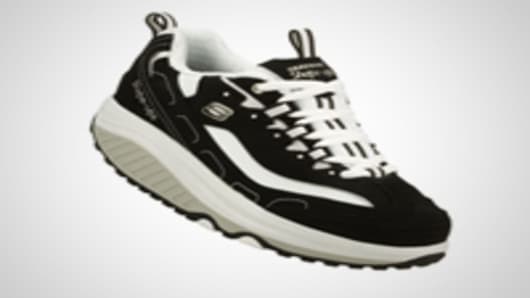Really, who can put a price on sexy legs?
Even in the throes of a recession, there are plenty of people who are willing to pay a premium for toning and shaping footwear, which is said to be designed to firm up the leg and butt muscles as you walk. Last year, this category generated $145 million in sales, up from just $17 million in 2008, according to a study by the NPD Group research firm.
That's an 88 percent increase. And the trend doesn't appear to be fading away anytime soon.
"In 2010, shaping up will be a theme for consumers," said Marshal Cohen, chief industry analyst at NPD. "Not only will they be looking to get their finances in shape, they will be looking to get their bodies in shape as well."
Though this category of footwear has been around for years, the recent spike can be attributed to some bigger players entering the market, making more consumers aware of its existence, experts said.
Reebok's EasyTone shoe and Skechers Shape-ups line are two of the more popular products to enter the market. Their established brand names and well-articulated marketing strategies — something previous players in the category lacked — helped catapult the category, said marketing consultant Laura Ries, of Ries & Ries.
"That happens all the time and shows why marketing — why the name and the message — are so important," she said.
Reebok has even upped the ante, by featuring sometimes-controversial commercials that not only grab your attention, but use close-ups of barely-clothed women to, um, highlight the potential benefits of the shoes.
MBT shoes, which were developed in the 1990s, were arguably the biggest name in shaping footwear before the recent surge in interest. But the company's poor marketing and branding prevented the innovative idea from becoming a household name, Ries said.
MBT's first problem was that it's difficult for consumers to remember acronyms if they don't already have an established reputation, Ries said. (Think IBM.) And the group's full name — Masai Barefoot Technology — isn't any better, she added.
That's because neither name spoke clearly to consumers about what the product does, as EasyTone and Shape-up do.
MBT's advertising tagline — the anti-shoe — also made it unclear what it was selling. She pointed to Red Bull's "Energy Drink" tag as an example of what the company should have done.
"The big race is not to build the shoe, but to get in the minds [of consumers]," she said.
Price is also a factor in today's economy. Reebok's EasyTones have a suggested retail price of $99, while Skechers Shape-ups line ranges between $110 and $120, according to prices listed on the company's Web site. But MBTs retail for north of $200.
Cohen said consumers can justify the purchase as a relatively "economical" way to get fit, both cost- and energy-wise. Consumers think to themselves: "If they really work, how easy is that?" and are willing to give it a try, he said.
Susan Kerth, a media relations officer at Webster University, said she and her walking buddy invested in a pair of MBTs several years ago, and they could feel how "tightened, toned and less jiggly" their thighs and backsides were, she said.
Though some argue that walking in and of itself is what helps a person's figure, Kerth swears she had walked for years without seeing the results MBTs produce.
"We all have nicknamed them the 'magic shoes,'" she said.
Because of their innovation and the momentum from word-of-mouth marketing, Cohen said he thinks the toning footwear category will continue to grow and evolve. He also predicts it will expand further among males, he said.
Ries, however, thinks it's a bit too soon for men to jump on board, despite Skechers signing on former football Hall of Famer Joe Montana as a spokesperson. But she does think women will continue to buy into the product.
"If women think they're going to get rid of some cellulite, they'll do almost anything," Ries said. "Whether or not they'll work well who knows, but you obviously feel like you're doing something different than [in] the traditional shoe."
More from Consumer Nation:
- Who's Getting Some Love This Valentine's Day?
- Chips, Dip, Mobile Phone: Ready for the Big Game?
- Building Buzz: It's Not Just About Free Pizza
- Wake Up Retailers! Fashionistas Are Back
- Off Target?
Questions? Comments? Email us at consumernation@cnbc.com



